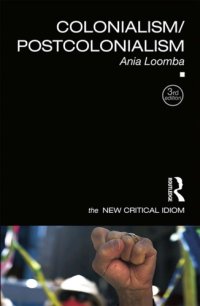
Ebook: Colonialism/Postcolonialism
Author: Ania Loomba
- Tags: Movements Periods Ancient Classical Arthurian Romance Beat Generation Feminist Gothic Romantic LGBT Medieval Modern Modernism Postmodernism Renaissance Shakespeare Surrealism Victorian History Criticism Literature Fiction Asian Chinese Indian Japanese Regional Cultural Emigration Immigration Social Sciences Politics International World Government Colonialism Post Specific Topics Humanities New Used Rental Textbooks Specialty Boutique Political Science Civil Rights Relations Ideologies Public Aff
- Series: The New Critical Idiom
- Year: 2015
- Publisher: Routledge
- Edition: 3
- Language: English
- pdf
Colonialism/Postcolonialism is a comprehensive yet accessible guide to the historical, theoretical and political dimensions of colonial and postcolonial studies.
This new edition includes a new introduction and conclusion as well as extensive updates throughout. Topics covered include globalization, new grassroots movements (including Occupy Wall Street), the environmental crisis, and the relationship between Marxism and postcolonial studies. Loomba also discusses how ongoing struggles such as those of indigenous peoples, and the enclosure of the commons in different parts of the world shed light on the long histories of colonialism. This edition also has extensive discussions of temporality, and the relationship between premodern, colonial and contemporary forms of racism. This books includes:
- key features of the ideologies and history of colonialism
- the relationship of colonial discourse to literature
- anticolonial thought and movements
- challenges to colonialism, including anticolonial discourses
- recent developments in postcolonial theories and histories
- issues of sexuality and colonialism, and the intersection of feminist and postcolonial thought
- the relationship of activist struggles and scholarship.
Colonialism/Postcolonialism is the essential introduction to a vibrant and politically charged area of literary and cultural study. It is the ideal guide for students new to colonial discourse theory, postcolonial studies or postcolonial theory as well as a reference for advanced students and teachers.